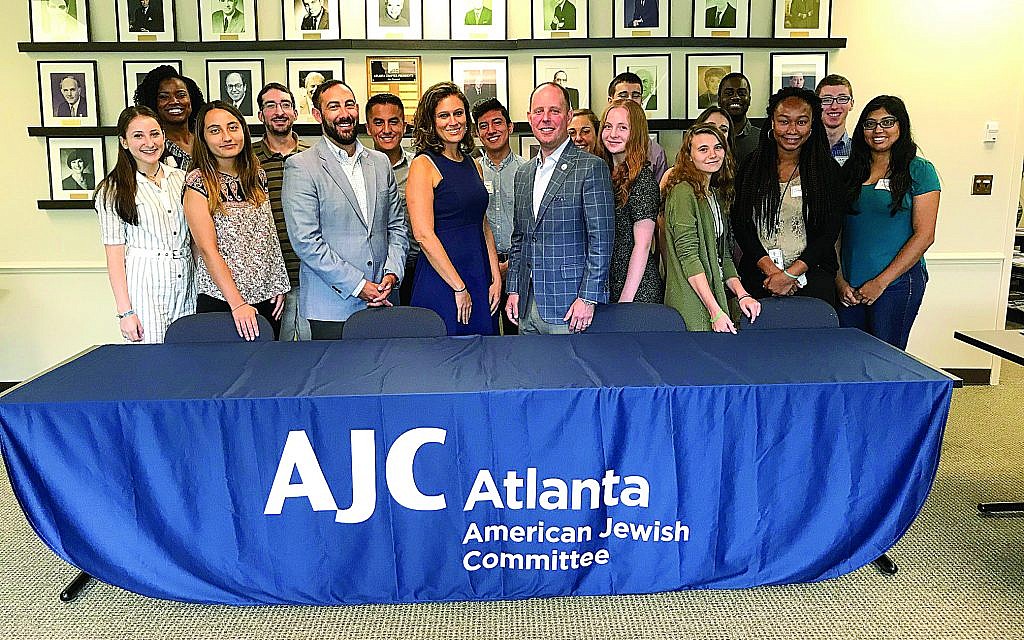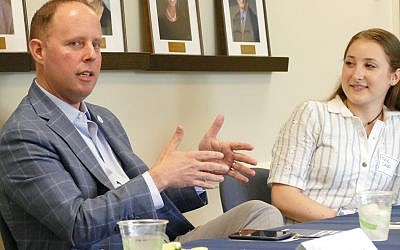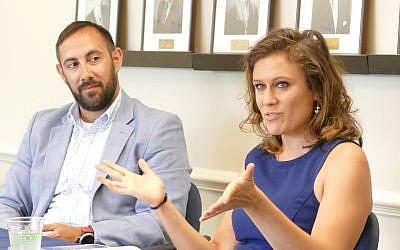Interfaith Interns Prepare for Advocacy
14 interns from various interfaith organizations attended a luncheon and panel discussion.

Interns who work in the realm of advocacy may not always find a job that matches their passion. But learning from people who have succeeded before them may help them create their own opportunities.
That opportunity was granted to 14 interns from various interfaith organizations such as the Anti-Defamation League, Arthur M. Blank Family Foundation, Latin American Association and Roman Catholic Archdiocese of Atlanta during a luncheon and panel discussion Wednesday, July 18, organized by Julie Covall, American Jewish Committee’s 2018 Goldman fellow.

To learn more about how to continue their careers in advocacy, the interns heard from AJC Regional Director Dov Wilker, Welcoming Atlanta Director Michelle Maziar and Hands on Atlanta President and CEO Jay Cranman. They spoke about networking, Jewish values, failures and what skills they need to attain a job in advocacy, at the panel discussion held at the AJC’s Buckhead office.
Get The AJT Newsletter by email and never miss our top stories Free Sign Up

Wilker says he never set out to be a professional Jew, but believes it’s up to each person to find and create a job description. “I love my job. Some people say that is the hardest thing to find, a job that you love and that you are passionate about, but a part of me feels that I have been able to create a job. Often times there isn’t a job description, you create it yourself,” Wilker said. “Your ability to create a job is almost more important than what is written on paper,” he said.
Maziar added, “A lot of the jobs and roles are not actually out there, so I would encourage you to move from a place of “What is the work you want to do?” and “What is the impact you want to have?” as opposed to “What job is most applicable now?’”
Maziar said that networking is just as crucial when finding a job that matches people’s passions, but not all networking is equal. “Really think about who you are, what your personality is and how you best connect with people. … Really think about networking as who you are, integrate where you shine and definitely feel free to dictate those terms. I think that is where networking is the most successful,” she said.
Cranman added, “Don’t ever do networking where you are just collecting names, but always do networking where you are giving more than you are getting and you will find that good karma will come back your way.” He said that in today’s world people also should have a side hustle.
“In the world of wanting to givie back and wanting to have an impact in the community, you are not always going to have it immediately, in the exact job you are doing, but everyone can have a really cool side hustle. Everyone can volunteer; everyone can pick a fight and get involved, be a big brother or sister and do some other things.”
But failures are a part of the process, Wilker said. “I try to block out significant failures, but I think about what I didn’t do. When I finished my MBA, it took me four months to find a job. I was super cocky and super confident. I lived in Israel; I spoke Hebrew and English and I had experience and an MBA, and thought I was hot s— and nobody cared,” he said. “Ultimately, I found a job that I liked, but in hindsight I shouldn’t have taken it. … But it was a great experience because it brought me humility that I think I really needed.”
Wilker added that having religious values whether Jewish or not may help when trying to create or find a career in advocacy. “On the one hand, it’s very obvious: I believe in the work of educating people about the Jewish community, about Zionism, about Israel; I live it every single day. On the other hand, my Jewish values inform the way I interact with people, what type of education I’m looking for. I believe that within Judaism the value of questioning is key.”
The right skill sets are also essential to landing an ideal job, the panelists said. “To be successful in today’s society I think you have to be comfortable being in the spotlight. You have to be comfortable sitting in the middle of the room and being the center of attention, speaking coherently and making points, and I think the best way to do that is to teach someone else to do it,” Cranman said.
Yet for Wilker, being able to build relationships and understanding the other person’s perspective are two reasons he finds his job in advocacy rewarding. “It’s okay to have relationships with people with whom you vehemently disagree on a lot of things with, and I almost think that is something in today’s society that has been lost,” he said. “But what we need is to empower moderate, diverse voices, even if they are opinions you don’t support.”




comments